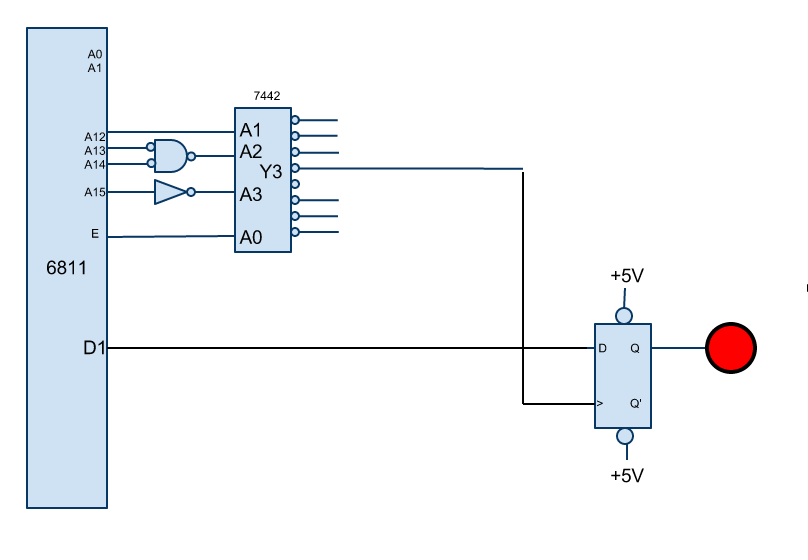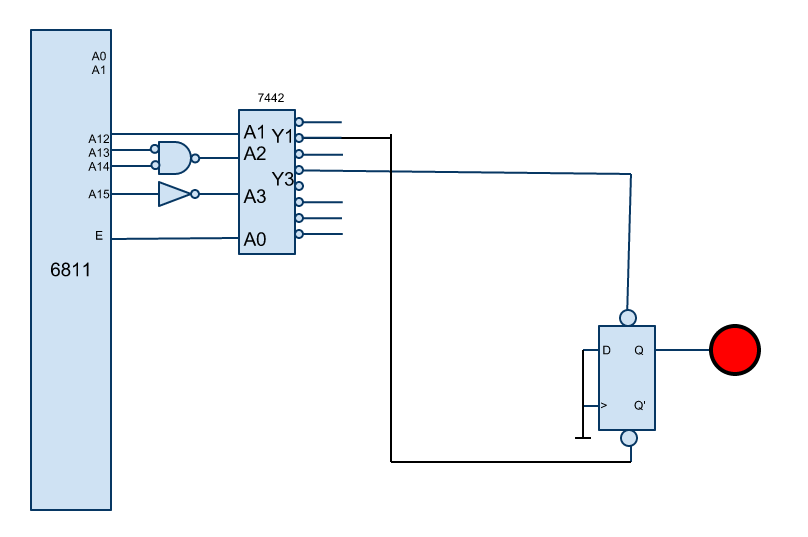Difference between revisions of "CSC270 Homework 9 2012"
(Created page with "--~~~~ ---- <bluebox> This assignment is due on 4/18/12, at the beginning of the lab. </bluebox> <br /> =Problem #1= Write the ''driver'' for the hardware shown below, that con...") |
(→Problem #3) |
||
| (9 intermediate revisions by the same user not shown) | |||
| Line 2: | Line 2: | ||
---- | ---- | ||
<bluebox> | <bluebox> | ||
| − | This assignment is due on 4/18/12, at the beginning of the lab. | + | This assignment is due on 4/18/12, at the beginning of the lab. You can work on this homework in groups of at most 2 people. |
</bluebox> | </bluebox> | ||
| Line 9: | Line 9: | ||
Write the ''driver'' for the hardware shown below, that consists of a 1-bit port attached to a red LED. The driver should be a collection of 2 functions, one to turn the LED ON, and another function to turn the LED OFF. | Write the ''driver'' for the hardware shown below, that consists of a 1-bit port attached to a red LED. The driver should be a collection of 2 functions, one to turn the LED ON, and another function to turn the LED OFF. | ||
| + | |||
| + | Note that who ever designed this circuit didn't use the same approach you took in the lab. In particular this design is more expensive in terms of gates. Also, make sure you notice that the port is connected to D1 of the ''Data Bus'', and not D0 as you did in the lab... | ||
<br /> | <br /> | ||
| Line 14: | Line 16: | ||
[[Image:CSC270_1BitPortForHomework_MessedUp.png|700px]] | [[Image:CSC270_1BitPortForHomework_MessedUp.png|700px]] | ||
</center> | </center> | ||
| + | |||
| + | =Problem #2= | ||
| + | |||
| + | Same question with the hardware shown below. This time the wiring is even more interesting... Y1' from the 7442 is connected to the CLR' input of the 7474. Y3' of the 7442 is connected to the PR' input of the 7474. Both the D and clock inputs of the 7474 are grounded. | ||
| + | |||
| + | Write the driver (2 functions) that can be used to turn the LED either ON, or OFF. | ||
| + | <br /> | ||
| + | <center> | ||
| + | [[Image:CSC270_1BitPortForHomework_ClearPresetControls.png|700px]] | ||
| + | </center> | ||
| + | |||
| + | =Problem #3= | ||
| + | |||
| + | For this problem you have to design the hardware and write the software for a new port that will interface with the 6811. The hardware interface should activate an LED that will either blink at 500 KHz, or not blink at all, in which case it will stay OFF. | ||
| + | |||
| + | You need to propose a design that combines both hardware and software. | ||
| + | |||
| + | You should present your hardware design in the form of a schematic diagram (see above for inspiration). | ||
| + | |||
| + | The software design should be just two functions, one to activate the 500 KHz oscillation. The other to turn the oscillation OFF. For example, below is a simple program that uses the two functions you have to write. The documentation explains what is going on. | ||
| + | |||
| + | <source lang="asm"> | ||
| + | org 0000 | ||
| + | start: jsr oscillate ;make hardware start 500KHz oscillation | ||
| + | jsr C027 ;make oscillations last 1 second | ||
| + | jsr turnLEDOff ;stop oscillations | ||
| + | jsr C027 ;LED stays off for 2 seconds | ||
| + | jsr C027 | ||
| + | jmp start | ||
| + | |||
| + | oscillate: | ||
| + | ... ;your code goes here | ||
| + | rts | ||
| + | |||
| + | turnLEDOff: | ||
| + | ... ;your code goes here | ||
| + | rts | ||
| + | </source> | ||
<br /><br /><br /><br /><br /><br /><br /><br /><br /><br /><br /><br /><br /> | <br /><br /><br /><br /><br /><br /><br /><br /><br /><br /><br /><br /><br /> | ||
[[Category:CSC270]][[Category:Homework]][[Category:6811]] | [[Category:CSC270]][[Category:Homework]][[Category:6811]] | ||
Latest revision as of 06:52, 12 April 2012
--D. Thiebaut 15:31, 11 April 2012 (EDT)
This assignment is due on 4/18/12, at the beginning of the lab. You can work on this homework in groups of at most 2 people.
Problem #1
Write the driver for the hardware shown below, that consists of a 1-bit port attached to a red LED. The driver should be a collection of 2 functions, one to turn the LED ON, and another function to turn the LED OFF.
Note that who ever designed this circuit didn't use the same approach you took in the lab. In particular this design is more expensive in terms of gates. Also, make sure you notice that the port is connected to D1 of the Data Bus, and not D0 as you did in the lab...
Problem #2
Same question with the hardware shown below. This time the wiring is even more interesting... Y1' from the 7442 is connected to the CLR' input of the 7474. Y3' of the 7442 is connected to the PR' input of the 7474. Both the D and clock inputs of the 7474 are grounded.
Write the driver (2 functions) that can be used to turn the LED either ON, or OFF.
Problem #3
For this problem you have to design the hardware and write the software for a new port that will interface with the 6811. The hardware interface should activate an LED that will either blink at 500 KHz, or not blink at all, in which case it will stay OFF.
You need to propose a design that combines both hardware and software.
You should present your hardware design in the form of a schematic diagram (see above for inspiration).
The software design should be just two functions, one to activate the 500 KHz oscillation. The other to turn the oscillation OFF. For example, below is a simple program that uses the two functions you have to write. The documentation explains what is going on.
org 0000
start: jsr oscillate ;make hardware start 500KHz oscillation
jsr C027 ;make oscillations last 1 second
jsr turnLEDOff ;stop oscillations
jsr C027 ;LED stays off for 2 seconds
jsr C027
jmp start
oscillate:
... ;your code goes here
rts
turnLEDOff:
... ;your code goes here
rts

